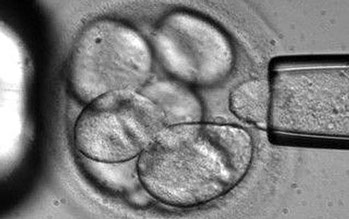




4 - 5
<
>
PHOTONe
Stem Cell Research:
Today’s most promising yet controversial frontier of biological research
.gif) By far one of the most extensively researched topics as of today is Stem Cells. It is one of the most intriguing topics of research with immense potential but has also been debated vociferously by scientists, politicians and social activists due to it’s unethical and anti-religious nature. However, it has taken biological sciences to an all new level and has revolutionized the way we will see life sciences for ever more.
By far one of the most extensively researched topics as of today is Stem Cells. It is one of the most intriguing topics of research with immense potential but has also been debated vociferously by scientists, politicians and social activists due to it’s unethical and anti-religious nature. However, it has taken biological sciences to an all new level and has revolutionized the way we will see life sciences for ever more.
Stem cells are cells with the ability to continuously divide,develop and differentiate into various other kinds of cells or tissues. This term was coined by Alexander Maksimov in 1908 when he first said that all blood cells develop from a common cell, later it was proven to be true for all cells of an organism.
Stem Cells are of five different types when classified with regard to where they are found in the human body. The first type is embryonic stem cells found in the blastocyst, the second found in the blood of the umbilical cord,the third type in the amniotic fluid,the fourth in the zygote and lastly in various adult tissues in the organism. The second classification is according to potency of the cell. Stem cells can be totipotent, which turn into all the cells of the organism or pluripotent, where they can change into many type of organism cells or they can be multipoint, where they only change into a specific variety of cells and lastly unipotent, where they have the ability to only change into one type of organism cells.
 The characteristic of stem cells to multiply and differentiate into various other organism cells has also opened up an immense number of potential uses of these cells. Scientists have said that stem cells can be used to study development of a complex of multicellular organism from a fertilized egg. Scientists can observe what makes stem cells divide and differentiate,thus being able to conclude what controls normal development. Stem cells can also be used to study disease as it is difficult to procure cells with the disease,scientists can engineer stem to carry the disease and model the disease processes so as to understand how these diseases arise and provide an alternative therapy. Stem cells can provide another resource for medical testing that will reduce the need for animal and human testing. The most interesting and renowned use of these cells is the ability to replace damaged cells and treat disease. Stem cells can be engineered to change into specific cells and replace them and this does offer the scope to cure diseases such as Parkinson’s, stroke, heart diseases, arthritis, blindness and deafness to name a few but significant hurdles still remain that require intensive research to overcome.
The characteristic of stem cells to multiply and differentiate into various other organism cells has also opened up an immense number of potential uses of these cells. Scientists have said that stem cells can be used to study development of a complex of multicellular organism from a fertilized egg. Scientists can observe what makes stem cells divide and differentiate,thus being able to conclude what controls normal development. Stem cells can also be used to study disease as it is difficult to procure cells with the disease,scientists can engineer stem to carry the disease and model the disease processes so as to understand how these diseases arise and provide an alternative therapy. Stem cells can provide another resource for medical testing that will reduce the need for animal and human testing. The most interesting and renowned use of these cells is the ability to replace damaged cells and treat disease. Stem cells can be engineered to change into specific cells and replace them and this does offer the scope to cure diseases such as Parkinson’s, stroke, heart diseases, arthritis, blindness and deafness to name a few but significant hurdles still remain that require intensive research to overcome.
As much as stem cell research has it’s positives,it has been that much a source of debate across the world. In embryonic stem cell research,the embryo has to be destroyed to obtain stem cells. This has sparked of the debate of whether or whether not the embryo has the status of a human being. Christianity and Hinduism believe that the embryo is human and embryonic stem cell research should not be permitted. At the same time Judaism and Islam emphasize the importance of helping others and have allowed this research. Thus,this research poses a moral dilemma to choose between preventing suffering or respecting the value for human life. The second scientific controversy has been around the fact that stem cells may cause cancer if we only know how to culturally grow the cells but have no means of limiting this growth.
Along with doing this research,we also have the responsibility of handing it over to the next generation and we must decide,keeping in mind our conscience and moral ethics,if this research is the right step ahead or are we playing with life as god?Are we as the human race responsible enough to use this research for the right purpose only or can it fall into wrong hands and be misused?It is all our decision.
ONe
ISSUE XVII